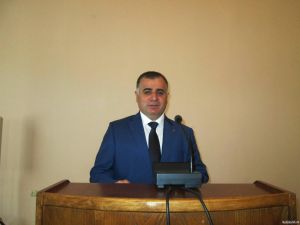Armenian Sunday school of Russian city of Podolsk announces start of new school year

The activities of the Armenian Sunday school of the Russian city of Podolsk serve as a good example of consolidation of the potential of the Armenian community around Armenian cultural values, the idea of strengthening Armenian statehood and the plans for Armenian-Russian cooperation. This is what political scientist Yuri Navoyan announced on 2 October as he traditionally announced the launch of the 14th school year of the Armenian Sunday school of the city of Podolsk of Moscow region.
According to Hayern Aysor, the event was held at School #15 of Podolsk where the Armenian school opens its doors on Sundays. Remembering how the Armenian Sunday school was established, Yuri Navoyan stated that the past years proved the viability of the four-level system and the specially developed curriculum.
The active participation of hundreds of graduates of the school in the social and economic life of the city and region and in the programs for cooperation with Armenia also reinforces the success of the school. Navoyan congratulated the attendees on the 25th anniversary of Independence of the Republic of Armenia and on Teachers’ Day, as well as expressed gratitude to the Municipality of Podolsk and Principal of School #15 Yelena Vakuleva for the longstanding collaboration. The Armenian political figure donated another batch of books to the school’s library. There are not only books by Armenian writers, but also studies devoted to Armenian history and culture by foreign researchers.
The opening ceremony featured speeches by Vice-President of Nairi Armenian Society of Podolsk Arageghetsik Ghazaryan, Principal of the Armenian Sunday school Andranik Mkrtchyan and homeroom teacher Alvard Samsonyan. The students performed numbers that were based on the works of Armenian writers and composers.
The Nairi Armenian Society and the Armenian Sunday school of Podolsk were established in 2003 by Yuri Navoyan and in partnership with the task force comprised of the local Armenians. The establishment of the society and school was part of the plan to establish Armenian schools and community organizations in the large cities of the Moscow region.




 Արևելահայերեն
Արևելահայերեն Արևմտահայերեն
Արևմտահայերեն Русский
Русский






